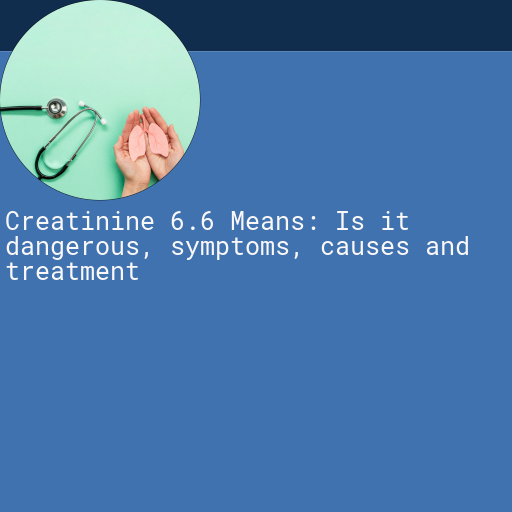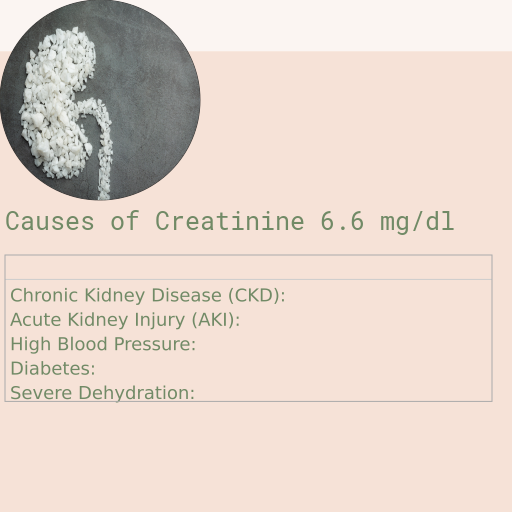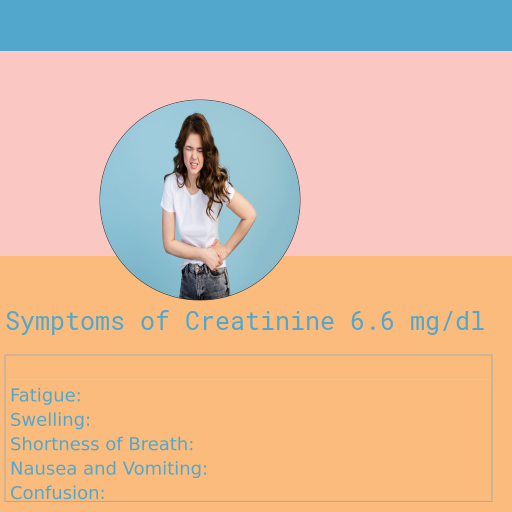Creatinine 6.6 : Is it Dangerous, Causes, Symptoms and More
Understanding the implications of elevated creatinine levels is crucial for maintaining kidney health. When a blood test reveals a creatinine level of 6.6, it can be alarming, indicating potential kidney dysfunction. Creatinine, a waste product from muscle metabolism, is normally filtered out by the kidneys. However, various factors can cause an increase, such as chronic kidney disease, dehydration, or severe infections. High creatinine levels can lead to symptoms like fatigue, swelling, and shortness of breath, signaling the need for immediate medical attention to prevent further complications.

What is Creatinine
Creatinine is a byproduct of protein breakdown that occurs naturally in the body, specifically from muscle metabolism. As a waste product, it has no use in the body and is typically filtered out by the kidneys and excreted in urine. When kidney function is impaired, creatinine levels can build up in the blood, indicating potential health issues that require medical attention.
- Meat Consumption: Creatinine is a byproduct of muscle metabolism, so eating meat, especially red meat, can increase levels.
- Muscle Breakdown: Conditions that cause rapid muscle breakdown, such as rhabdomyolysis, can significantly elevate creatinine levels.
- Exercise: Intense physical activity can lead to higher creatinine levels due to increased muscle metabolism.
- Kidney Function: Poor kidney function can lead to elevated creatinine levels as the kidneys are less efficient at filtering it out of the blood.
- Medications: Certain drugs, including some antibiotics and nonsteroidal anti-inflammatory drugs (NSAIDs), can affect creatinine levels.
- Dehydration: Lack of adequate fluid intake can lead to higher creatinine levels due to reduced blood flow to the kidneys.
- High Protein Diet: Consuming a diet high in protein can result in increased creatinine production.
- Chronic Diseases: Conditions such as diabetes and hypertension can impair kidney function, leading to higher creatinine levels.
Normal Range of Creatinine in Adults
In adults, the normal range of creatinine levels in the blood can vary slightly depending on factors such as age, sex, muscle mass, and overall health, but generally falls between 0.6 to 1.2 milligrams per deciliter (mg/dL) for men and 0.5 to 1.1 mg/dL for women. These values are considered standard and deviations from this range could signify potential kidney issues or other health concerns. Regular monitoring of creatinine levels is crucial for maintaining good health and early detection of possible complications.
| Age Group | Normal Creatinine Range (mg/dL) |
|---|---|
| Newborn (0-1 month) | 0.3 - 1.0 |
| Infants (1 month - 1 year) | 0.2 - 0.5 |
| Children (1-12 years) | 0.2 - 0.7 |
| Adolescents (13-18 years) | 0.5 - 1.0 |
| Adult Males | 0.6 - 1.2 |
| Adult Females | 0.5 - 1.1 |
| Older Adults (60+ years) | 0.6 - 1.3 |
Causes of Creatinine 6.6
Elevated creatinine levels can be a significant health concern, often indicating underlying issues that require medical attention. The primary function of creatinine is to serve as a waste product, filtered by the kidneys from the bloodstream. When the kidneys are not functioning properly, creatinine levels can build up in the blood. Several factors can contribute to this elevation, including kidney disease, dehydration, and muscle damage. Understanding the root causes of elevated creatinine is essential for effective diagnosis and treatment, ensuring that the underlying health issues are addressed promptly and appropriately.
- Chronic Kidney Disease (CKD): A long-term condition where the kidneys gradually lose their function.
- Acute Kidney Injury (AKI): A sudden decrease in kidney function, often due to severe dehydration, infection, or injury.
- High Blood Pressure: Persistently elevated blood pressure can damage the kidneys over time.
- Diabetes: Uncontrolled blood sugar levels can lead to diabetic nephropathy, a leading cause of elevated creatinine.
- Severe Dehydration: Lack of sufficient fluids can affect kidney function and lead to elevated creatinine levels.
- Medications: Certain drugs, like nonsteroidal anti-inflammatory drugs (NSAIDs) and some antibiotics, can impact kidney function.
- Muscle Disorders: Conditions like rhabdomyolysis, where muscle tissue breaks down, releasing creatinine into the bloodstream.
- High Protein Diet: Consuming large amounts of protein can temporarily boost creatinine levels.

Symptoms of Creatinine 6.6
When creatinine levels rise, it often signals underlying health issues that need attention. Common symptoms of elevated creatinine include fatigue, swelling in the limbs, and changes in urination, such as reduced output or dark-colored urine. Patients may also experience shortness of breath, nausea, and a loss of appetite. Recognizing these symptoms early can be crucial for timely intervention and effective treatment.
- Fatigue: High levels of creatinine can lead to a general feeling of tiredness or weakness.
- Swelling: Often in the face, hands, and feet due to fluid retention caused by impaired kidney function.
- Shortness of Breath: Fluid buildup in the lungs can make breathing difficult.
- Nausea and Vomiting: Elevated creatinine can cause gastrointestinal symptoms.
- Confusion: High creatinine can affect mental clarity and lead to confusion or difficulty concentrating.
- High Blood Pressure: Impaired kidney function can result in elevated blood pressure levels.
- Decreased Urine Output: A noticeable reduction in the amount of urine produced.
- Muscle Cramps: Elevated creatinine levels can lead to muscle discomfort and cramps.

Dangers of Creatinine 6.6
While creatinine itself does not directly affect the body, its elevated levels serve as a critical indicator of potential health issues, particularly concerning the kidneys. High creatinine levels often signal kidney failure or other serious conditions that impair kidney function. This situation is alarming because the kidneys play a vital role in filtering waste products from the blood. When the kidneys are compromised, other harmful waste products like urea can accumulate in the body, leading to a range of adverse health effects. Understanding and addressing elevated creatinine levels is crucial for preventing further complications and maintaining overall health.
- Kidneys: Elevated creatinine levels can indicate impaired kidney function, potentially leading to chronic kidney disease or acute kidney injury.
- Heart: High creatinine levels may increase the risk of cardiovascular complications, including hypertension and heart failure.
- Liver: Although less common, elevated creatinine can sometimes be linked to liver problems, exacerbating conditions like cirrhosis.
- Lungs: Impaired kidney function can lead to fluid retention in the lungs, causing pulmonary edema and respiratory distress.
- Muscles: High creatinine might be a sign of muscle breakdown, which can occur in conditions like rhabdomyolysis.
- Brain: Severe kidney dysfunction can result in an accumulation of toxins that affect brain function, leading to confusion or encephalopathy.
- Blood: Elevated creatinine is often associated with electrolyte imbalances, which can affect overall blood chemistry and health.
- Bones: Impaired kidney function can lead to bone mineral imbalances, increasing the risk of osteoporosis and fractures.
Home remedies for Creatinine 6.6
Disclaimer: Elevated creatinine levels, such as a creatinine of 6.6, indicate a serious medical condition that cannot be treated at home and requires immediate professional attention. It is crucial to consult a healthcare provider for a proper diagnosis and treatment plan. While basic supportive care, such as maintaining adequate hydration, following a low-protein diet, and avoiding over-the-counter medications that can harm the kidneys, can be beneficial, these measures are not substitutes for professional medical intervention. Ensuring regular medical check-ups and adhering to prescribed treatments are essential for managing elevated creatinine levels effectively.
- Stay Hydrated: Drinking plenty of water can help flush out toxins and support kidney function. Aim for at least 8-10 glasses per day, unless advised otherwise by your doctor.
- Limit Protein Intake: Consuming less protein can reduce the workload on your kidneys. Opt for plant-based proteins and consult a dietitian for a balanced diet plan.
- Avoid Over-the-Counter Medications: Some medications, especially NSAIDs like ibuprofen, can harm kidney function. Always consult your healthcare provider before taking any new medication.
- Monitor Blood Pressure: High blood pressure can worsen kidney damage. Regularly check your blood pressure and follow your doctor’s advice to keep it within a healthy range.
- Reduce Sodium Intake: High sodium levels can increase blood pressure and strain the kidneys. Opt for low-sodium alternatives and avoid processed foods.
Treatment for Creatinine 6.6
When a creatinine level reaches 6.6, it signifies a potentially severe issue with kidney function, necessitating immediate medical attention. The primary treatment goals in such situations are to stabilize kidney function, discontinue any harmful medications that could be exacerbating the condition, and address any underlying infections or health issues contributing to the elevated creatinine. Prompt and effective medical intervention is crucial to prevent further deterioration and ensure the best possible outcome for the patient.
- Medication Adjustments: Doctors might prescribe medications such as ACE inhibitors or ARBs to help manage and lower creatinine levels.
- Dietary Changes: A renal diet that limits protein, sodium, and potassium can be essential in managing high creatinine levels.
- Hydration: Increased fluid intake can help flush out creatinine from the body, but it's important to follow a doctor's advice to avoid overhydration.
- Treating Underlying Conditions: Addressing conditions like diabetes or hypertension that can impact kidney function is crucial for reducing creatinine levels.
- Dialysis: In severe cases, dialysis may be necessary to artificially remove waste products, including creatinine, from the blood.
GFR with Creatinine of 6.6
When discussing kidney health, it's essential to introduce the concept of Glomerular Filtration Rate (GFR), which is a crucial measure of how well your kidneys are filtering blood. Unlike the absolute value of creatinine, which can vary due to factors like age, gender, and muscle mass, GFR provides a more accurate assessment of kidney function. By estimating the amount of blood filtered per minute, GFR offers a comprehensive picture of renal efficiency. This is why healthcare professionals often prioritize GFR over creatinine levels when evaluating kidney health, as it accounts for individual differences and gives a clearer indication of potential issues.
| Grade | GFR (mL/min/1.73 m²) | Meaning |
|---|---|---|
| G1 | ≥ 90 | Normal or High |
| G2 | 60-89 | Mildly Decreased |
| G3a | 45-59 | Mild to Moderate Decrease |
| G3b | 30-44 | Moderate to Severe Decrease |
| G4 | 15-29 | Severely Decreased |
| G5 | < 15 | Kidney Failure |
What is my GFR for a creatinine of 6.6
| Age | Gender | GFR |
|---|---|---|
| 18 | male | 11.03 ml/m2 |
| 45 | male | 9.16 ml/m2 |
| 60 | male | 8.64 ml/m2 |
| 80 | male | 8.15 ml/m2 |
| 18 | female | 8.18 ml/m2 |
| 45 | female | 6.79 ml/m2 |
| 60 | female | 6.41 ml/m2 |
| 80 | female | 6.04 ml/m2 |
Table of danger posed by Creatinine 6.6 in male across different ages
| Age Group | Is Creatinne of 6.6 dangerous? |
|---|---|
| 25yrs - 95 yrs | very dangerous, Get immediate medical advice and treatment. |
Table of danger posed by Creatinine 6.6 in female across different ages
| Age Group | Is Creatinne of 6.6 dangerous? |
|---|---|
| 25yrs - 95 yrs | very dangerous, Get immediate medical advice and treatment. |

Which other tests should be done for a creatinine value of 6.6?
When faced with a high creatinine level of 6.6, it's crucial to conduct additional diagnostic tests to get a comprehensive understanding of kidney health and overall bodily function. Tests such as electrolytes can help measure the levels of essential minerals like sodium, potassium, and calcium, which are vital for heart and muscle function. A renal profile can offer detailed insights into how well the kidneys are filtering waste, while blood gas levels can provide information on the body's acid-base balance and oxygenation status. Together, these tests can offer a more complete picture and guide effective treatment strategies.
- Electrolytes: This test measures the levels of essential minerals like sodium, potassium, and chloride in the blood. Electrolyte imbalances can indicate kidney dysfunction and other metabolic issues.
- Renal Profile: A comprehensive test that includes measurements of blood urea nitrogen (BUN), creatinine, and glomerular filtration rate (GFR). It provides a detailed overview of kidney function and can help diagnose the severity of renal impairment.
- Blood Gas Levels: This test measures the levels of oxygen, carbon dioxide, and the pH of the blood. Abnormal levels can indicate respiratory or metabolic conditions, which may be related to kidney dysfunction.
- HbA1c: Glycated hemoglobin test that measures average blood sugar levels over the past 2-3 months. High HbA1c levels can indicate poorly controlled diabetes, which is a risk factor for kidney disease.
- LDH: Lactate dehydrogenase is an enzyme found in almost all body tissues. Elevated LDH levels can indicate tissue damage, including kidney damage, and can help in diagnosing the underlying cause of elevated creatinine.
- Urea: This test measures the amount of urea nitrogen in the blood. High levels can indicate reduced kidney function and help in assessing the severity of renal impairment.
- Liver Enzymes: Tests like ALT and AST measure the levels of liver enzymes in the blood. Abnormal levels can indicate liver dysfunction, which can sometimes be associated with kidney issues.

 By: Dr.Bhargav Raut
By: Dr.Bhargav Raut